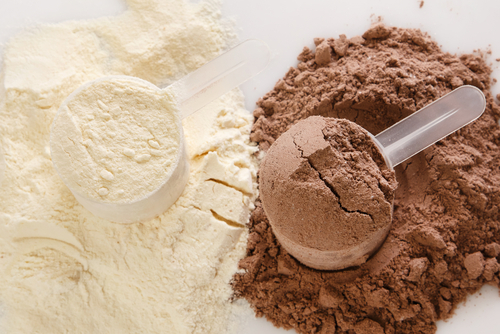Short answer
Whey protein is, for the most part, not bad for you. There are a few ingredients to be cautious of, but overall, it provides excellent nutrition to the body.
Recommended Alternative
Long answer
There are two types of protein in milk: casein and whey. Casein is found in the curds of milk when it is turned into cheese, such as in cottage cheese. Whey is found in the watery portion of milk that separates when the fat sinks to the bottom, during the cheese making process. After the whey is extracted from milk, it is dried out and then made into a commercial powder.
During the cheese making process, the fat in milk coagulates and the whey separates from it as a by-product. For example, whenever you open a container of yogurt or sour cream, you typically see a liquid substance at the top, before it is stirred. That substance is whey. It has very few carbohydrates, a small amount of lactose in it, and it contains all nine vital amino acids. Whey is considered a complete protein, making it the perfect supplementation for those wanting to lose weight, and those who simply need more protein in their diets.
There are three types of whey protein, determined by how the whey is processed. It is marketed commercially as a powder, however, after being treated one of three ways, it is considered a health supplement. The three types of whey protein are whey protein concentrate (WPC), whey protein isolate (WPI), and whey protein hydrolysate (WPH).
WPC is the first stage of whey processing, once it is removed from milk. This type of whey protein contains high levels of lactose, including fat and sugar. It also maintains all the amino acids, due to its minimal processing. Though the high level of amino acids has great nutritional benefits, the long chain can make the substance difficult to digest. Of the three types of whey protein, it has the least amount of protein. As a result of it being minimally processed, it is the most inexpensive form of whey protein. Due to the high lactose content, some people report negative gastro-intestinal symptoms from this. It is important to try supplemental products in small amounts prior to working it into your daily diet and remain aware of the large amount of lactose.
WPI is further processed, and all fat and lactose are removed from it. Due to the heavy protein content (about 90% per serving), this is the most widely sold whey protein product in gyms and protein supplements. It is attractive to many people because of the removal of lactose, making it lower in calories and easier to digest. However, long chain amino acids can still give gastrointestinal irritation.
WPH has undergone partial hydrolysis to make it more easily digestible. Overall, this is the easiest form of whey protein to digest. Not only is the lactose removed, but enzymes pre-digest the long chain of amino acids, lowering the likelihood of stomach irritation. In addition to its popularity in work out beverages, it is also used in baby formulas and in some pharmaceuticals. This high-quality form of whey protein comes at a cost. On average WPH is twice the price of the simplest form, WPC.
The health benefits of whey protein are still under scrutiny, but many studies have shown that when consumed during weight lifting sessions, whey protein can increase muscle mass. This type of protein is also possibly related to weight loss, lowering cholesterol, improving asthma, and reducing the risk of cardiovascular related health problems.
Although whey protein does not contain large amounts of lactose, those with a lactose or milk allergy or even a sensitivity to milk and milk products, should avoid whey protein. The small amount of lactose can adversely affect them. Diabetic patients should note that, in many cases, blood sugar levels are affected by the consumption of whey protein. Additionally, whey protein can reduce blood pressure. Patients taking blood pressure medication should take the proper cautions to ensure that their blood pressure is not compromised, as a result of consuming whey protein.
Some whey protein powder brands include additives, such as sugar, artificial sweeteners, and artificial flavorings to increase the powder’s appeal, as it does not have an appealing taste in its natural state. Be aware that all of these additives produce dangerous health effects in the body. An alternative is to create a smoothie drink from the powder, including fresh fruit for a boost in flavoring.
Since whey protein powder is considered a dietary supplement, the Food and Drug Administration (FDA) does not regulate it under the Dietary Supplement Health and Education Act of 1994 (DSHEA). Whey protein manufacturers do not need to register their products or seek FDA approval before selling.
Possible short-term side effects
- blood sugar spike
- lactose intolerance
- lactose allergen
- bloating
- diarrhea
- digestive problems
- complications with diabetes patients
- contraindicated with some hypotension medications
- contraindicated with hypotension
Possible long-term side effects
- cancer depending on artificial additives used
Ingredients to be aware of
- lactose
- sugar
- possible artificial additives

Benefits
- improves heart health
- lowers cholesterol
- treats asthma
- weight loss
- improves muscle mass in conjunction with exercise
- lowers blood pressure
Our Wellness Pick (what is this?)
Gold Standard Whey Protein
- High-quality protein
- Supports muscle recovery
- Rich chocolate flavor
- 5-pound quantity
- Trusted brand
 Approved by
Approved by 















